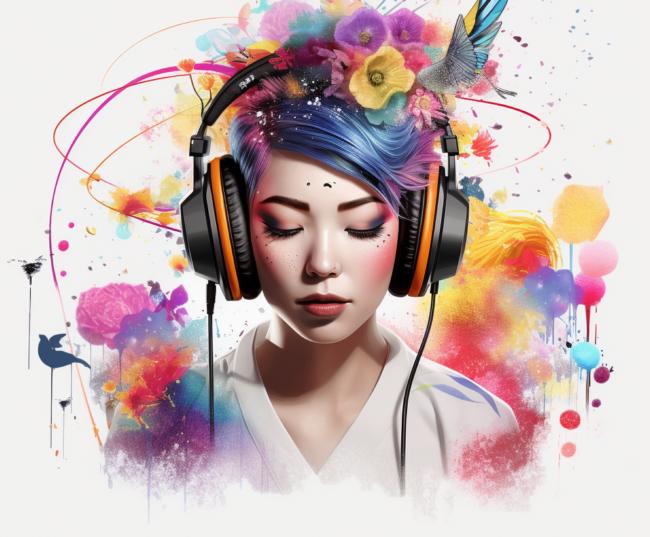The Impact of Music on Mental Health

Music: The Lovechild of Sanity and Insanity
Ladies and gentlemen, let's discuss the lovechild of sanity and insanity: music. You see, music has a little something called the "Mozart effect," which basically states that listening to Mozart can make you smarter. However, I find it difficult to believe that listening to classical music can increase intelligence when I can hardly differentiate between Mozart and Motörhead. Regardless, music does have a profound impact on mental health, much like tequila has on your decision-making skills.Music: The Swiss Army Knife of Mood Modifiers
Music is a multi-faceted tool that can induce an emotional roller coaster. It can bring you to tears or make you jump for joy depending on the tune and your personal association with the melody. From The Beatles to Beethoven, one's mental health can be altered with a simple press of the play button. If music were an item at the grocery store, it would be in the same aisle as mood stabilizers and anxiety medications. So, next time you're feeling down, ditch the Prozac and crank up some tunes. Just make sure it's not Nickelback - no one's mental health deserves that kind of torture.Music: The Brain's Personal Trainer
If you ever wondered why your brain feels like it's running a marathon after listening to complex music, it's because your brain is essentially lifting weights at the mental gym. Music activates multiple regions of the brain, such as the prefrontal cortex, which is responsible for planning, reasoning, and decision-making. So, the next time you have a big decision to make, like whether or not to swipe right on Tinder, throw on some Bach or Beethoven to stimulate your cranium. Just remember, the music doesn't make the choice for you - it's still up to your brain, which may or may not be operating under the influence of tequila.Music: The Therapist You Didn't Know You Needed
Music has a unique ability to temporarily transport you to another place, allowing you to escape your current reality. Say you're having the worst day ever - you spilled coffee on your favorite shirt, your boss yelled at you, and your dog left a "surprise" on your new rug. The ability to momentarily leave this reality through music is invaluable, as it provides a much-needed break from the stressors of life. Plus, unlike therapy, listening to music doesn't require a co-pay or an appointment. So, next time you're feeling overwhelmed, plug in those headphones and let the therapeutic tunes do their magic. Though, if your dog continues to leave surprises on your rug, you may need to invest in a more traditional form of therapy.Music: The Social Lubricant
Just as a glass of wine can loosen you up at a party, music can help ease social anxiety and improve your overall mood. Music has a way of making people come together, whether it's a group of strangers dancing at a concert, or a couple slow dancing to "their song." Music transcends language barriers and can unite people from different walks of life. But, of course, there are exceptions. If your "social lubricant" involves blasting mumble rap at full volume in a quiet neighborhood, you may find yourself with fewer friends and more complaints from your neighbors.Practical Advice: How to Use Music to Boost Your Mental Health
Now that we've established that music is a powerful tool for mental health, let's get down to business. How can you use music to improve your well-being? Here are some practical tips:- Choose the right tunes: Look for music that reflects your desired mood, whether it's calming classical or upbeat pop. Avoid songs that trigger negative emotions.
- Use music strategically: Make a playlist for specific situations, such as a morning playlist to start your day, or a bedtime playlist to help you unwind.
- Embrace the power of music: Allow yourself to fully experience your chosen music, whether that means dancing around your living room or belting out your favorite tunes in the shower.
- Share your music: Don't be afraid to share your favorite music with others, as it can foster a sense of connection and camaraderie.
Article kindly provided by healthyvoices.net
Latest Articles
- How Oral Health Quietly Influences Energy Sleep and Long Term Well Being
- How Emotions Affect Your Skin
- Everyday Walks as Brain Games for Your Dog
- How Light Weights Can Build Serious Strength
- Missing Dental Supplies and What They're Really Telling You
- Rethinking Early Intervention Strategies for Childhood Behavior Support
- Keep Going: The Brain Science of Turning Setbacks Into Momentum
- Designing Movement Routines That Don't Feel Like Exercise
- Chair Yoga Works Wonders For Bodies Of All Ages
- Eyebrows Through the Ages and What They Reveal About Our Faces
- Feeding Plans That Keep Every Pet in Balance
- Hidden Immune Boost Hiding in Plain Sight for Corporate Travellers
- Evening Quiet Isn't Automatic and That's Perfectly Normal
- Quiet Power Makes a Salon Feel Like a VIP Retreat
- Chewing as Meditation and Everyday Calm
- Sleep Deprivation as a Social Problem, Not a Personal Failure
- Why Recovery Rituals Outlast Resolutions and Keep Us Moving Forward
- Desk Job Survival with a Side of Shoulder Rolls
- Why Your Living Room Layout Might Be Causing Your Back Pain
- Why Your Teeth Love Dental Hygienists
- Nutrition and Dietetics
- Exercise and Fitness
- Meditation and Yoga
- Mental Health
- Women's Health
- Men's Health
- Children's Health
- Senior Health
- Heart Health
- Sleep Health
- Skin Health
- Eye Health
- Dental Health
- Pain Management
- Addiction and Recovery
- Sexual and Reproductive Health
- Alternative Medicine
- Chronic Conditions
- Weight Management
- Occupational Health and Safety
- Public Health
- General Health Tips
- Beauty

